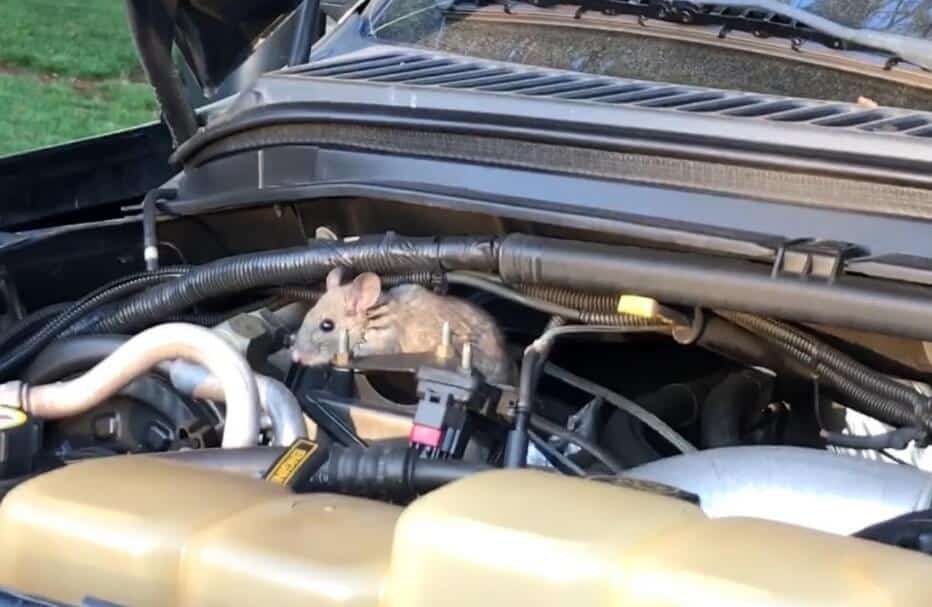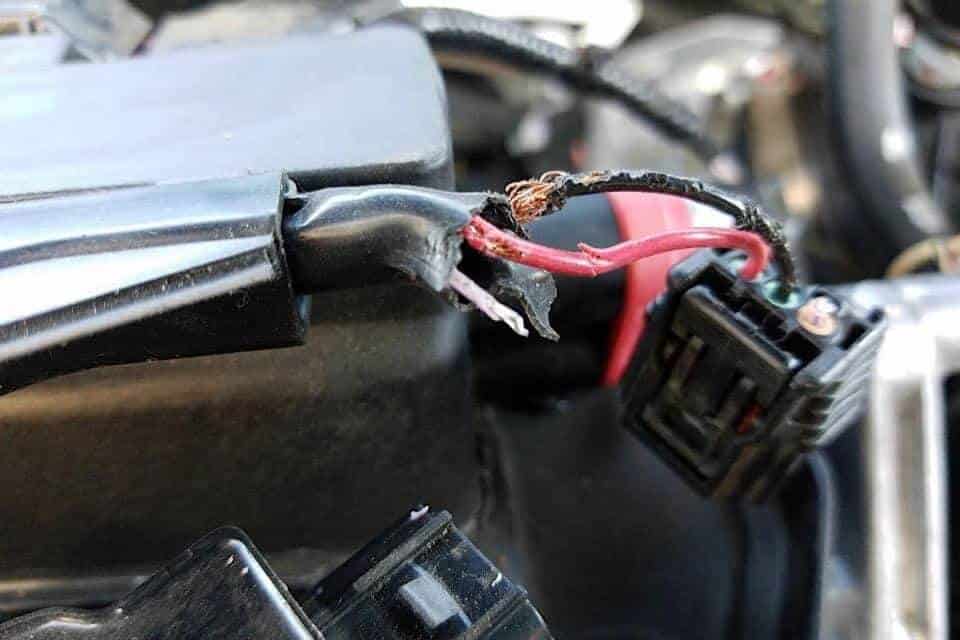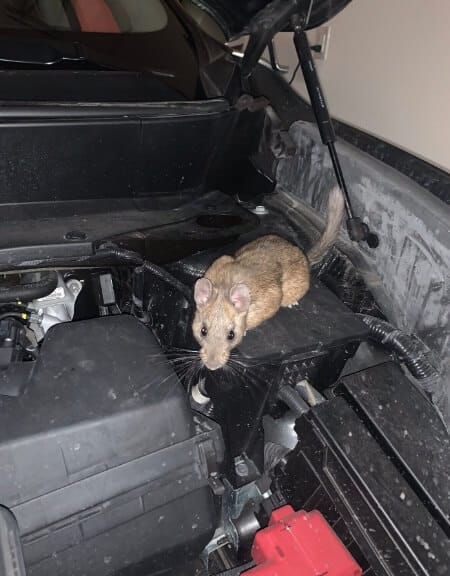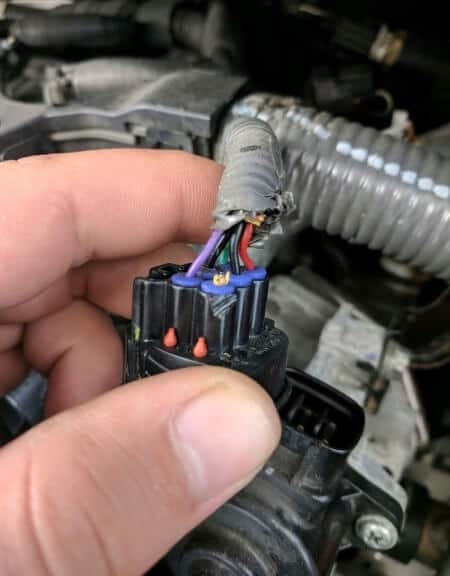Are you fed up with the rodent damage to car wiring? Do you want to know how to stop rodents from chewing car wires? Or what is the best rodent repellent for cars to keep rodents away from car engine compartment? If yes, then you have landed in the right place. This guide will help you learn everything you need to know about preventing rodents from chewing car wires.
Rodents love to live around humans because they get easy food, shelter, and sometimes even a ride in your car! These pests can cause severe issues if they feel comfy inside your vehicle. They can feast on electrical wires, fluid tubes and cause a major malfunction. The mechanics may show some sympathy in such a situation, but they won’t reduce the cost to fix rodent chewing car wires!
So, how to stop rodents from chewing car wires? You know they will nibble things made of plastic, rubber, and fabric. What can you do to keep these problem-causing creatures out of the car and your house?

People have been dealing with rats and other pests for many centuries. You can use a few reliable solutions that are mentioned below to prevent rodents. Modern keys are much more reliable than old-school ways of exterminating these rodents. Continue reading to learn how to keep mice out of the car engine compartment forever.
Why Do Rodents Chew Car Wires?
Do rodents chew car wires? Yes, they chew anything made of rubber, plastic, and such soft materials. So, why do rodents chew car wiring? They can’t possibly digest wiring material!
Most rats nibble plastic and rubber objects in the hope of finding some food. The car wire insulation can be made of rice husks, soy, peanut oil, and other plant-based materials. The smell of these insulations draws rats. They think it is an appetizing object, and thus, they start nibbling aromatic car wires.
You must be curious to know what kind of rodents eat car wires. Rats are infamous for causing this trouble. They are everywhere, and their habits are pretty similar. It doesn’t matter what brand’s car you are using or what model it is. The rat will get inside it if your car’s wiring smells delicious.
People didn’t know why mice chewed car wires for a long time. Experts revealed the reason after researching rodents’ eating habits. They have also found some efficient solutions for this issue. Do you also want to know how to prevent rats from eating car wires, if yes then you are going to find the 11 best ways to prevent rodents from chewing car wires very useful for you.
Must check: 13 Reasons Why Your Check Engine Light Comes On and Off
Does Car Insurance Cover Rodent Damage (Chewed Wires)?
Is there a rodent chewing car wires insurance? There is no such insurance, but you can easily find car insurance that covers animal damage! You should prefer comprehensive auto insurance coverage because it will cover most of the damages caused by animals.
Many vehicle owners do not know about rodent damage to car wiring insurance. They presume the insurance won’t cover the damage and bear all the repair costs. You should not make the same mistake, especially if you got comprehensive coverage!
Many vehicle owners have faced financial issues due to rodents chewing car wires. Most people are unaware of the solutions to prevent cars from rodents and rats. Therefore, they use ordinary rodent repellents for cars.

The main thing is to examine whether your car insurance may cover the repair cost. Damage due to nests, frayed wiring, and other types of damage caused by animals can be covered. You should carefully check the insurance policy to find out what sort of animal damages it covers.
Insurers are aware of what sort of damage rats and rodents can cause. Therefore, they offer comprehensive coverage to pay for such damages. Sometimes rodents can cause more harm than hitting an animal on the road. Consequently, it is a significant issue, and insurance coverage is available to cover the repair cost.
You might also like: How to Keep Mice Out of Car Engine Compartment (13 Ways)
How to Stop Rodents from Chewing Car Wires (11 Best Ways)
Do rodents keep coming back to your home and cause expensive damages to your cars and household items? It is time to take some drastic measures against these pests to protect your belongings. Try the following solutions to keep rats and other rodents out of your property forever!
Keep Your Car Clean and Away from Food Trash
Rodents have no interest in your vehicles! These animals wander around our homes and properties to find some food. If you do not clean the car regularly, the chances are high that rodents will establish their dwelling inside your vehicle.
It is essential to thoroughly clean the vehicle at least once a week to get rid of dust, pollutants, and rodents! Take your car to a local garage so that the professional can clean it inside out.
You should never park the vehicle near food trash. Keep the trash bean away from the garage so that rats won’t enter inside the garage for food. Thus, you will prevent rats from treating car wires as food.
Park Your Car in a Sealed Garage
There should be a safe space to park the vehicle if you want to stop rodents nesting in car engines. Please do not leave the car outside the house where animals and rodents can easily access it. Both large and small animals have easy access to your car’s interior, and they can cause massive damage.
A sealed garage is a perfect space for protecting the vehicle. Your car will be safe from burglars, birds, and animals. You can even place some rat repellents inside the closed garage to prevent these rodents from entering inside the car. Many car owners have tried this solution, and it worked!
Keep Your Car Engine Bay Clean
You are most likely to find a rat nest inside the car engine bay! Clean it regularly to avoid significant damage. It may sound improbable, but rats chewing car wires and fluid tubes is most common when you don’t clean or wash the engine bay.
So, open the hood, cover sensitive components, and start cleaning the engine bay. If you think you are not an expert at this job, then take the car to a local car cleaning center. The mechanic will thoroughly inspect the engine bay to find an unwanted intruder and clean it. Thus, your vehicle will be safe against rodents and in perfect running condition.
Use Rodent Repellent Spray for Cars
Sometimes ordinary measures do not work against obstinate rodents. You have to try the best solutions available to keep these creatures away from the car. And when it comes to going for a highly effective way to stop rodents from chewing car wires, using a high-quality and best rodent repellent for cars is one of the most appropriate things to do.
The Exterminators Choice Vehicle Defense Rodent Repellent Spray is the best rodent repellent for cars in the market. It can keep rats away from boats, cars, trucks, and expensive machines. This non-toxic mouse and rat repellent has been designed to protect all sorts of wirings from rat damage.
If you don’t want to see rat nests, chewed wires, and rodent damage on your property, you should definitely use it. You can use this rodent defense vehicle protection spray to keep rodents away from car, ATVs, RVs, farm equipment, motorcycles, and more.
And if you want a bit safer alternative then Mighty Mint 16oz Peppermint Oil Rodent Repellent Spray is quite effective as well. It is entirely natural and smells great. It uses peppermint essential oil to keep rats away.
This oil works as a natural rodent repellent for cars and forces rats and mice to leave the property without extreme measures. Both recommended rodent repellents have gained car owners’ trust for exceptional performance.
These rodent repellers are safe to use inside the car and other machines. They won’t affect your health, but rodents have to go anywhere closer to these things. That’s why thousands of car owners use these repellents.
Use Rodent Deterrent Tape for Car Wires
When people search how to prevent rats from eating car wires, they mostly find repellent products. However, rodent deterrent tape is another reliable product to protect car wires from rats. This tape wraps tightly around car wires and is extremely tough to nibble.
Although the rodent tape may not prevent the attractive odor of cables, but it will undoubtedly prevent rodents from reaching the soft layer of car wires. There are two top-quality rodent deterrent tapes designed to protect vehicle wirings.
The 3M Scotch Electrical Shielding Tape is vehicle owners’ top pick because it has tinned copper conductor construction. This tape is ideal for outdoor and indoor uses because freezing or overheating won’t affect its performance.
This premium grade electrical tape will perfectly interlock with the upper layer of wires to have a tighter grip and superb protection. If all the cables and tubes were covered with this rodent deterrent tape, you wouldn’t need rodent repellent for cars.
The Stuff-fit – DS8044 Copper Mesh is another excellent choice to prevent expensive car wire repair. You can cut this mesh into long and slim pieces to wrap around the car’s exposed wiring.
Rodents won’t be able to nibble wiring because this mesh will protect wires as a steel structure. It is affordable, reliable, and quite effective when it comes to safeguarding soft objects from rats.
Set Rodents Traps to Get Rid Of Rats
If you want to go old school, you may employ the mousetrap, the oldest technique in the book. Bait the rodent with a tasty treat, and then capture it! But the ancient caging technique is hardly used now as there are new inventions in the field.
There are countless sticky-tape traps available in the market for purchase, and using the Tomcat Glue Traps is a fine idea for the same. They are perfect for sticking the rats in them.
Then there are the Pest Control Rat Traps as well that you can use ideally. If you want to stop the rats from getting into the vehicles, you may put them in these traps beforehand.
The scattering of certain food items about the traps causes them to become more attracted to those places, resulting in their presenting themselves in front of the traps faster.
This technique is ideal for obtaining the required assistance at every level while attempting to capture a mouse gnawing on the automobile wiring and causing damage to the inside of your vehicle’s interior. It is where these sticky pads are the essential ones.
Use an Electronic Rodent Repellent for Car
Because of the damage caused by rats, mice, and rodents to vehicle car wires by chewing them, no one wants them in their vehicle. Out of various methods, the electrical rodent repeller for Vehicles is an efficient and safe method to safeguard your vehicle against pests and rodents, such as rats, mice, beavers, and squirrels, etc.
You can prevent rodents from entering your vehicle by an ultrasonic sound in the range of 24-84 kHz. Use this kind of insect repellant in your vehicle to keep rodents away, and don’t even think about the bugs. Electronic repellents are proven to be effective in preventing rodent infestation before it ever gets started.
Furthermore, they are entirely harmless to use around children and non-rodent pets since they are inaudible to everyone but rats and do not contain any chemicals or toxins.
Now that Angveirt Under Hood Rodent Repeller and Loraffe Under Hood Animal Repellers are the best electronic deterrent devices for cars and trucks, you can expect the best deals there to eradicate the rodents.
You can choose them to prevent rodents and rats from entering your vehicle and wiring areas of the engine. They can be plugged into your car and can offer long-term safety against rodents.
Leave Your Car’s Hood Up and the lights on at night
Are you dealing with the question, how to prevent rodents from chewing wires underneath the car hood? The majority of rats like to build their nests in gloomy areas.
They dislike light in general, but mainly while they are sleeping. As a result, try turning the lights inside the garage or parking in an area with plenty of illumination. Suppose you leave your car’s hood open to allow light to reach the customarily concealed crevices of the car’s interior.

In that case, you may prevent mice and rats from constructing nests and establishing permanent residence in your vehicle’s interior. During the day, you may leave the car doors open just enough to guarantee that the car inside receives the most significant amount of direct sunshine.
Mild lashing, static light charges, and vibration are all possibilities. High-frequency sonics may be used by others, although they may be short or confined in their use. It is necessary to do research.
Their presence creates health hazards also, and if the condition develops, it may be potentially unhealthy. If you have problems with unwanted visitors such as mice, rats, and other rodents, opt for this option.
Start Your Car Engine Regularly
Cars are the generally chosen transportation method, whether it’s for a road trip, a romantic night drive, or a group of friends going to their favorite food place together. Not everyone, on the other hand, is welcomed in the vehicle.
But if a car is parked for a long time, it may quickly become a breeding place for rats and mice if left alone. Even when you’re not planning on taking the vehicle for a trip, it is recommended that you start the engine and let it scream for a few minutes regularly.
Do not let the vehicle’s engine run for an extended length of time without producing a roar. At the very least, you can take a few short drives nearby when you have the opportunity.
Keep in mind that the longer the vehicle will be in operating condition, the fewer alternatives will be available for keeping rats away from the car’s wiring and other vulnerable places. In the vehicle zones, the vibrations and the noises deter the rats from congregating.
Aside from that, there are some car regions where the temperature starts to rise while the ignition is on. Consequently, mice are forced to leave the car whenever the engines are started regularly since these are not their favorite locations to live.
Get Rodents Chewing Car Wires Insurance
Most occurrences involving animal damage are rodents eating car wires, and it is covered by comprehensive vehicle insurance coverage; however, this coverage is not available in every insurance policy; therefore, check your policy carefully.
Your insurance company will usually assist you in defraying the cost of repairs as long as you have selected comprehensive coverage and have fulfilled your deductible requirements.
Furthermore, you may take several preventive measures detailed below to prevent rats from eating through your vehicle’s wiring in the first place.
If you have comprehensive coverage on your vehicle insurance, the costs of repairing or replacing the damage caused by rodents, such as frayed wires or damage caused by a nest, will usually be covered.

If your car is on lease or loan, comprehensive coverage is typically required. Lenders add comprehensive coverage as a condition of the lease and loan contract to preserve their vehicle investment. The rest of the time, it’s an optional add-on. Therefore we suggest that you check your car insurance policy.
Hire a Professional Rodent Removal Service
Getting rid of rats chewing car wires and nesting under car hoods is a bit difficult and even hazardous if they are not handled correctly. You may be tempted to eliminate rodents that make their way into your car on your own, but this is not recommended. So, it could be wise to hire a team of professional rodent removal services to protect your vehicle from damage.
Investing in effective rodent removal and prevention now may save you money in the long run by reducing the amount of damage you sustain. For the most part, a professional rat removal service is the most effective method of removing these unwelcome visitors.
Rodent control experts have received specialized training to cope with the challenges and dangers posed by rodents in their work. They will collaborate with you to create an effective strategy for assisting in managing your rodent issue.
This plan also takes into consideration the specific requirements of your family. Hence, it is another best option to go with to prevent or remove rodents from causing further damage.
Do you know? How to Make Air Conditioner Colder in Car (13 Best Ways)
How to Prevent Rats from Eating Car Wires [FAQs]:
Despite all the valuable information provided above, it is evident that various questions will still arise in people’s minds regarding the rodents’ repellents for cars, their cost, usage, and many more. So, below are some most frequently asked questions that might assists you with;
You might have been thinking of various best rodent repellents for cars, as nowadays markets are filled with multiple brands and products. Which usually makes it challenging to choose the best product for yourself.
However, Loraffe under Hood Animal Ultrasonic rat repellent is one of the best electronic rodent repellents for cars that uses ultrasonic waves to prevent rats and rodents.
If you want to use a spray, then Exterminator’s defense rodent repellent is another perfect 1ltr gallon spray to avoid rats, raccoons, or nesting from your cars, boats, ATVs, and other four-wheelers.
Electronic rodent repellents for cars are the best mouse repellents that use high-frequency sound waves to keep rats and other rodents from vehicles. The manufacturers have also claimed the effect of ultrasonic waves on rodents.
Most ultrasonic waves produce sound frequencies over 20 kilohertz, disturbing or irritating the rodents like rats, mice, hamsters, and various pet rodents.
A study in 2015 by Arizona University has also stated that patents for electronic rodent deterrents have increased drastically, showing the popularity of electronic rodents among people to keep their vehicles and wires safe.
Despites of electronic and liquid rodent repellents, people, also try odors to keep rodents away. So, the question always arises, what smells will keep rats and mice away? Many people and even some companies are using the smell of astringent, menthol, and spicy odors to prevent rats and mice.
Other natural rodent repellents like peppermint oil, chili powder, citronella are also very effective for rodents and rats eating car wires.
At the same time, the odor of chemicals like ammonia, bleach, and mothballs is also quite an effective rodent repellent for cars. These chemical materials could be found in the home if peppermint oil and chili powders aren’t available.
It could affect your car and wallet if the rodents chewing car wires are frequenting in your vehicle. Some factors that will affect your pocket are the type of insurance you have, and if your insurance doesn’t cover rodent damage, it will cost you much higher.
These repairs also require decent labor work, so overall, it could cost you around $500 to $1500. On the other hand, your damaged repair cost could affect you even worse, especially in winters, as rats and other rodents look for a warm place, so what could be more comforting than your car’s engine and wiring places.
How to Prevent Rodents from Chewing Car Wires – Author’s View
In a nutshell, you must have learned how to stop rodents chewing car wires using these amazing rodent control techniques and rodent repellent products for cars. These are the important and most effective measures that you have to take to prevent and safeguard your car from rodents and rats. It is also recommended to keep your garage and area across your house and garage clean.
There are a few very effective measures you should always keep in mind. First and foremost is to provide enough sunlight and heat to your car during the day. Further, don’t forget to regularly ignite your engine to stop rodents from staying in your vehicle.
And last but not least, use electrical rodent repellers for cars forever to prevent rats and mice from entering your car anyway. These three precautions will assist you with the rodents chewing car wires problem and will also save you a considerable amount of money on damage repair.
You may also be interested in checking out:
- How to Stop Car Windows from Fogging Up in Winter (11 Ways)
- Why My Car Makes Humming Noise When Accelerating?
- Can Flood Damaged Cars Be Repaired? Is It Worth Fixing a Flooded Car?
- How to Get Water Out of Gas Tank in Car (6 Simple Steps)
- How to Stop a Windshield Crack from Spreading (6 Best Ways)



